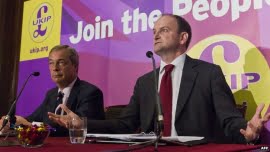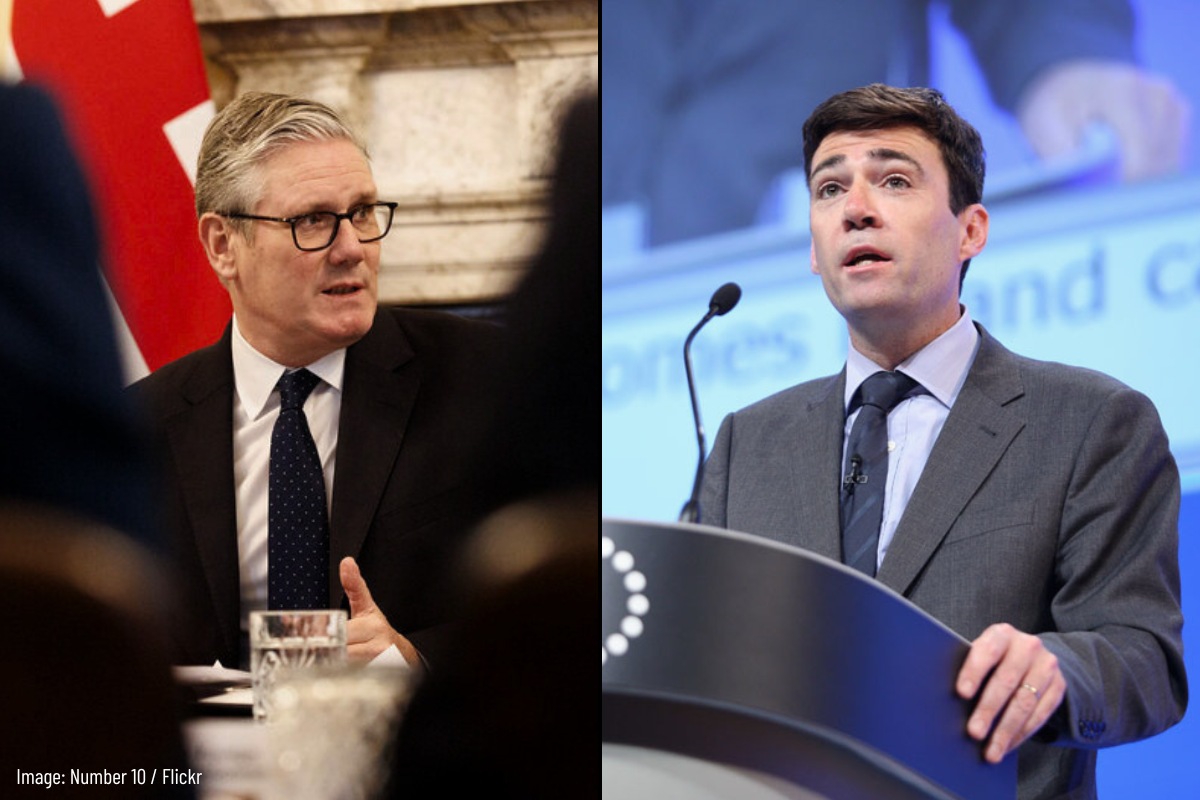Friday 10th October marked a gain for UKIP, as newly defected ex-Tory MP Douglas Carswell retained his seat at the Clacton by-election, giving UKIP their first-ever elected MP. At the same time, Labour were given a scare, as they almost lost their previously safe-seat of Heywood and Middleton. These results demonstrate the growing hatred towards the Coalition and the Establishment that they represent.
Friday 10th October marked a gain for UKIP, as newly defected ex-Tory MP Douglas Carswell retained his seat at the Clacton by-election. This gave UKIP their first-ever elected MP. The party also suprised many in the Heywood and Middleton by-election, where Labour held onto the seat by only 617 votes.
The result has of course been played upon by the media, with the BBC website rife with pictures of Farage and talk of what this could mean for the 2015 General Election. Farage has now been invited to attend the leaders’ debate, and the media are playing into UKIP’s hands by speaking of the extension of the British party-system. It is important to have a clear analysis of the magnitude of the result, the role of UKIP and what the trend towards UKIP means in the wider context.
Media hype and hysteria
In terms of the importance of the result, there are a few points to emphasise in order to downplay what has been cited as a major turning point in British politics. If we consider the context of the Clacton result, it is not all that surprising. The constituency was very much a Tory stronghold, with Carswell having received 53% of the vote when he stood as the Tory candidate in 2010. The second placed party was Labour, who received less than half the share the Tories did at just 25%. In 2010, UKIP did not stand at all and the BNP received 4.6% of the vote. The biggest loser at 2014 was the Tories, whose share of the vote plummeted to 24.6%, as many voters remained loyal to Carswell – now the UKIP candidate.
Labour and the Lib Dems also lost a considerable percentage of votes, but given how strong a Tory constituency Clacton was, and the already relatively small share of the vote held by Labour and the Lib Dems, the blow was clearly biggest for the Tories.
There is clearly strife afoot in the Tory Party: the right are not happy with Cameron’s handling of Europe and Boris Johnson still appears to be waiting in the wings. Carswell and Clacton will not be the only MP and constituency to defect to UKIP.
Collapse for the Coalition
The result in Heywood and Middleton could be said to be more significant. This was a Labour stronghold – Labour had a 12.9% majority in 2010 – where UKIP received only 2.6% of the vote in 2010. However, once again there are important qualifiers on this: Labour’s share of the vote actually increased by 0.8% of the vote. UKIP’s gain of 36.1% of the vote, therefore, is mainly due to a complete collapse in Tory and Lib Dem support – no doubt due to their participation in the hated Coalition. The very small turnout of 36% – and that is 36% of those registered, not 36% of all those over 18 in the constituency – should also be noted. The biggest section of the vote was those that stayed at home.
UKIP have managed to attract a certain layer towards them and it is important that we understand the reasons for this. Firstly it should be emphasised that the majority of UKIP’s support appears to be coming from disgruntled Tory voters. There are numerous signs that the Conservatives are in crisis. Two MPs have now defected to UKIP, Boris is waiting for the right moment take Cameron’s crown from him, and the Tory backbenchers appear to be irritated by the fetters of coalition government and Cameron, who they see as being too soft.
Anger against the status-quo
More widely, British parliamentary politics are at an impasse as voters increasingly feel that all parties stand for the same thing. Politicians are increasingly seen as being completely out-of-touch from the lives of ordinary people, and electoral turnouts continue to fall as workers and youth are given nothing more than a “choice” between different shades of austerity.
It is in this context that we saw the large turnout and high support for Scottish independence in last month’s referendum. At 87% it was the highest turnout at any vote in Britain since the extension of universal suffrage, reflecting that the referendum was seen to be offering “real” change in opposition to the average general election.
In England, Wales and Northern Ireland there are similar feelings of frustration about the status quo, but channels for directing this anger are lacking. This has led to incidents such as the militant student demonstrations of 2010 and the 2011 riots, but also a complete lack of enthusiasm for political parties – all of which, including Labour, have pledged themselves to austerity. In this situation a very small section of the most downtrodden elements of the working class may be attracted to the “anti-establishment”, “anti-party” rhetoric of UKIP.
Betrayal of the Labour leaders
The treacherous role of the Labour Party leaders cannot be underplayed. They have betrayed their working class base and pledged themselves to the bosses and millionaires by promising to echo Tory austerity with just a few changes here and there. Despite being in opposition to one of the most hated governments in British history, Miliband and co. are failing to gain any convincing leads in the polls.
The Labour leaders have no answers to the major change that the masses of people want to see in society. This is reflected in the fact that, in response to UKIP’s success on Friday, the Labour Party responded with a pathetic, racist pledge to be “tough” on immigration.
The answer to the frustration that people are experiencing – up and down Britain, Europe, and on a global scale – is not to be found in the Labour leaders moving further to the right, nor in a vote for UKIP. UKIP are simply the right-wing of the Tory Party wrapped up with “anti-establishment” rhetoric. Neither migrants nor those reliant on welfare are to blame for the problems that stem from the crisis of capitalism, which has wreaked havoc for working people of all nationalities.
Frustration is being channelled in different ways, but mostly remains bubbling under the surface due to a lack of other options. With no party offering a genuine alternative, this anger can express itself other ways, with sudden explosive expressions like the 2011 riots.
For real change – for revolution!
People are looking for change and the change that is needed is of revolutionary proportions. UKIP and all the other Westminster parties only offer further austerity and attempt to place blame for the crisis on immigrants, benefits claimants and other vulnerable people. This was a crisis created out of the anarchy of capitalism and perpetuated by the greed of the bankers and ruling class – they have continued to get richer while the poor have only gotten poorer.
The answer to the frustration of millions of people up and down Britain and internationally is to fight for the socialist transformation of society. Workers of all backgrounds, nationalities, sexualities, races and genders must join together in a struggle to put an end to the capitalist system. Instead of the madness of capitalism, We can take the banks and the major corporations into public ownership, planning the economy in a rational and democratic way for the good of the vast majority, instead of for the fat-cat and their profits.
UKIP is just one symptom of the decay of capitalism. The time has come for its overthrow.






